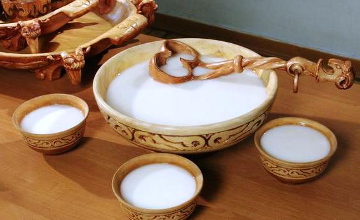ASTANA – Businessmen and scholars of the Zhambyl region promote Kazakh nano kumis and are confident that the traditional beverage of nomads will conquer the entire world. The realisation that kumis (fermented horse milk) had allegedly been patented in Germany was shocking for Kazakhs, noted a Sept. 19 article on Inform.kz.

According to the news agency, farmer and Zan LLP Director Dyusenbek Ibinaliyev, like many farmers who own mares, was producing kumis in small quantities until he heard the news that German Hans Zollmann had patented and begun manufacturing the drink.
“This news outraged me deeply. How could the Kazakh national beverage from so long ago be appropriated by a resident of far-away Germany? I could not agree with it,” said Ibinaliyev in the interview on the website.
Ibinaliyev spoke with Taraz State University’s former rector, Ashimzhan Akhmetov, telling him everything about the “concerning” patent deal. He received approval for his request to involve university scientists and sanitary and epidemiological stations with their own laboratory for the case, reported Inform.kz.
“We have developed and validated our own standard, technology and instruction. We observed the product’s acidity every week together with the university’s staff and took a simple Kazakh folk recipe as the basis,” said Ibinaliyev.
One big breakthrough was the possibility of increasing kumis’ shelf life to 60 days. Kazakh President Nursultan Nazarbayev commended Ibynaliyev’s idea and instructed the region’s leadership to support the initiative, according to the news agency.
Ibinaliyev obtained a patent in 2013 for his domestic method of producing kumis. The fermentation at the factory is made according to an old recipe from his ancestors.
His company produces products of four different levels of acidity under the Khan Kymyz brand. Its popularity has travelled far beyond the region, as buyers from Astana, Almaty, Aktau and Atyrau regularly purchase the milk. The firm also has a certificate of quality from the Customs Union that allows it to reach out to foreign buyers.
Developing dry, tableted kumis was another achievement of the university’s nano lab.
“The freeze-drying method is applied in the production of dry kumis. The method lies in a quick, shock freeze and crystallisation of water which is then entirely evaporated. Freeze-drying provides almost absolute retention of all nutrients; 10-11 grammes of powder come from one litre of milk,” said university nano lab senior researcher Nina Gorbatovskaya. “Desiccated kumis goes under a very high pressure and turns into a tablet without any binding material, whereas starchy substances are added for binding to other pills. 4.2 grammes of a single tablet substitute for two glasses of the drink and can be consumed by adding water, only make sure it is sterilised.”
Freeze-drying kumis was also developed in Germany, where approximately 30-40 farms produce and sell the milk, as reported by The Astana Times in an April 17, 2013 article. The beverage is also brewed in Austria, Belgium, Germany, Italy, Mongolia, the Netherlands, Ukraine and Russia’s Sireian region of Yakutia.
The confusion was clarified regarding the news about the German entrepreneur allegedly patenting kumis, according to Inform.kz. Zollmann did not patent the product itself or the technology of its production, but merely the product trademark under the name “Kumus.”
The story of where the German colleague learned the kumis recipe proved to be quite interesting, the article reported. During World War II, Zollmann’s relative by marriage was taken prisoner in the USSR, where a tuberculosis epidemic was present at the time and he contracted the terrible disease.
Following Joseph Stalin’s death in 1953, German prisoners were amnestied and convoyed to their homeland. The guard on the train carrying Zollmann’s in-law, apparently fearful for his health, decided those who were sick would not live long and left the poor, weakened wayfarer on a steppe. A Kazakh family found him and took care and cured him with the help of kumis.
When he returned to Germany, he spoke about his miraculous healing. The magical product could not go unnoticed and the German entrepreneurial streak manifested itself.
The Zollmann farm in the town of Waldbrunn is Germany’s first and largest mare’s milk farm. The milk is produced according to Demeter Biodynamic standards, along with mare’s milk powder and cosmetics, according to managerprogramm.de. Just five family members and six employees run the entire farm, with around 400 horses and approximately 450 hectares of agricultural land.
According to Zollmann, interest in the therapeutic properties of kumis grew in the 1960s after scientists discovered its positive effect in the treatment of lung diseases, digestive problems and weakened immunity, as reported by this newspaper before.
